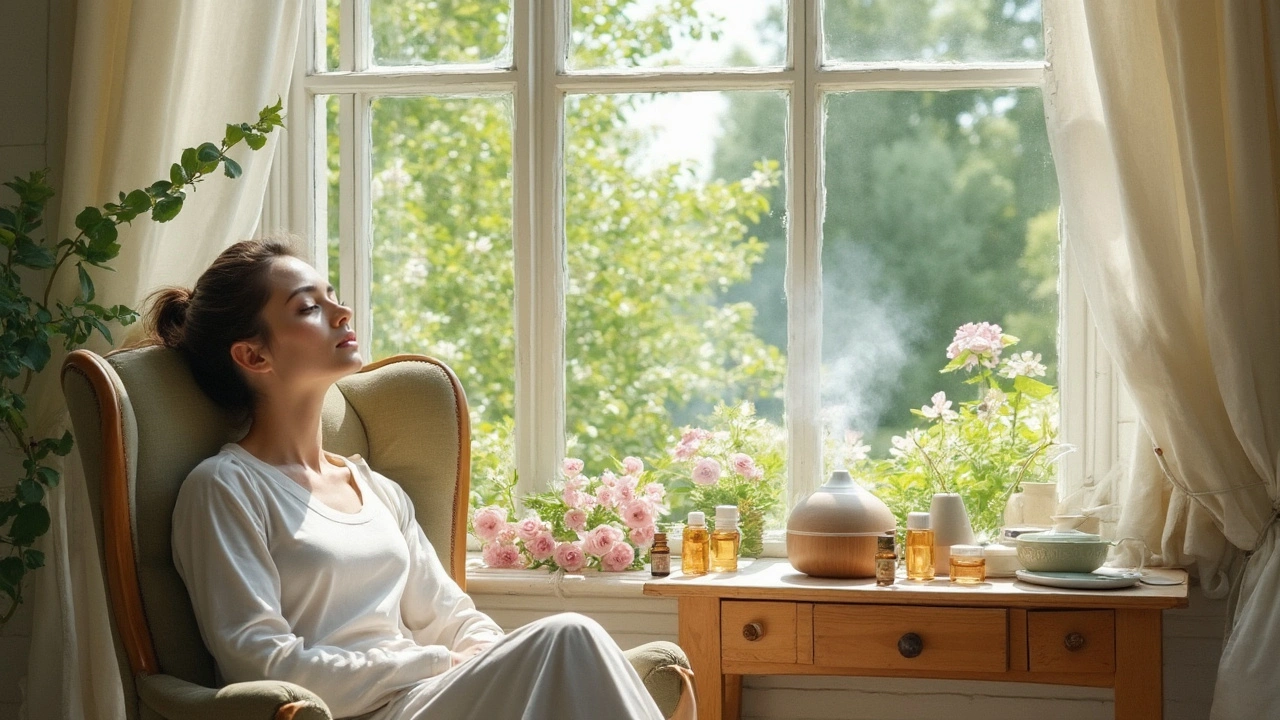Ever had a stuffy nose that just won't quit? Imagine reaching for something natural instead of the usual over-the-counter stuff. That's where aromatherapy comes in. Using essential oils from plants, this practice might just be the breathing buddy you didn't know you needed.
Let's talk about a few heavy hitters in the essential oil world. Eucalyptus oil, for instance, is like a superhero for your sinuses. Its fresh scent can help open those airways. And then there's peppermint oil, which can give you that cooling sensation that screams, ‘Ah, I can breathe again!’
Curious about how to use these oils? You might want to consider using a diffuser. It's a gadget that spreads the scent throughout your room. Or, try adding a few drops to a hot shower. As the steam rises, so will the comforting aroma.
- Introduction to Aromatherapy
- Essential Oils for Respiratory Health
- Methods of Using Aromatherapy
- Safety Tips and Precautions
- Incorporating Aromatherapy into Daily Life
- Testimonials and Success Stories
Introduction to Aromatherapy
Aromatherapy isn't some mystical art; it's all about using those aromatic plant extracts we call essential oils. This practice has roots going way back, we're talking about ancient Egyptian times! They used oils not just for their delightful scents but also for potential health benefits.
So, how does it all work? Great question. When you inhale these oils, the smell receptors in your nose communicate with parts of your brain like the amygdala and hippocampus. These brain parts handle emotions and memories, which is why certain oils can spark feelings of relaxation or help with focus.
People often jump to using aromatherapy for its calming effects, but there's another big pro. It can do wonders for respiratory health. Ever felt refreshed after a walk through a pine forest? That's because natural aromas can help clear the airways. This is where oils like eucalyptus and peppermint come in handy.
Why Choose Aromatherapy?
Maybe you're wondering, why even bother with aromatherapy? Here are a few reasons:
- Non-invasive: No need for pills or needles, just breathe in the fragrance.
- Diverse uses: From boosting your mood to helping you breathe easy, there’s an oil for nearly everything.
- Natural: If you're all about keeping it natural, essential oils might just be your new best friend.
If stats are more your thing, a recent survey found that nearly 62% of people who use aromatherapy feel it improves their quality of life (Source: Aromatherapy Association, 2023). It's all about finding what works for you.
Next up, we’ll dive into which oils are best for breathing. Spoiler: Your nose will thank you!
Essential Oils for Respiratory Health
Alright, let's get into the good stuff—how specific essential oils can boost your respiratory health. If you've ever used Vicks VapoRub, you're already familiar with the power of eucalyptus oil. This oil is famous for helping clear the airways, and it's a favorite for a reason. The natural compounds in eucalyptus can break down mucus, making breathing a lot easier.
Peppermint oil is another crowd-pleaser. Thanks to its menthol content, it's got a cooling effect that can really help unclog those nasal passages. Picture it as a natural answer to stifling congestion.
Eucalyptus and Peppermint: Dynamic Duo
Mixing a little eucalyptus and peppermint oil together might make an excellent respiratory relief blend. Start with a few drops of each in your diffuser, and see how it changes the air around you. Some folks swear by adding a few drops to a bowl of hot water and taking deep breaths of the steam.
"Essential oils have immense potential in supporting respiratory health when used correctly," says Dr. Lisa Brown, a renowned holistic health expert. "They can enhance breathing by opening nasal passages, and easing congestion."
Other Helpful Oils
Don't stop at eucalypytus and peppermint. Essential oils like lavender and tea tree oil also have respiratory benefits. They aren't just for calming nerves or disinfecting surfaces; inhaling these can help bump up your air game by reducing inflammation and soothing airways.
- Lavender Oil: Known for its relaxing properties, it can also help ease inflammation in the respiratory tract.
- Tea Tree Oil: Has antimicrobial elements that can help keep those nasal passageways clear by attacking germs.
If you've been thinking of going down the natural route for your respiratory health, give these oils a shot. Remember, you might need to try a couple of combinations to find what works best for you. Experiment, breathe easy, and see what relief these essential oils can bring to your daily life.
Methods of Using Aromatherapy
Figuring out the best way to harness the power of aromatherapy for your respiratory health can make a world of difference. Whether you’re a newbie or a seasoned aromatherapy enthusiast, there's always a method that'll suit you just right.
Diffusers: A Room Full of Relief
One of the most popular ways is using a diffuser. This handy gadget disperses essential oils into the air, so you can breathe in the benefits throughout the day. You simply add water and a few drops of your chosen oil, like eucalyptus or peppermint, and turn it on. It's like a mini humidifier, minus the medicinal smell.
Steam Inhalation: A Quick Fix
If you need a fast way to clear those airways, steam inhalation is your go-to. Boil some water, pour it into a bowl, add a few drops of oil, and carefully breathe in the steam. Covering your head with a towel might help trap the steam better. Just be cautious not to get too close to the hot water; we want to soothe, not scorch.
Topical Application: Keep It Close
For those who prefer a more direct approach, applying oils topically can be effective. Just remember to blend them with a carrier oil (like coconut or jojoba) to avoid irritation. Rub the mix on your chest or back for that direct-to-lungs relief.
Shower and Bath: Soothe as You Soak
Transform your shower or bath into a spa-like experience by adding essential oils. For showers, sprinkle a few drops on the walls (not the floor—slippery!) and let the steam carry the scent. For baths, mix the oils with a bit of Epsom salt before adding them to the water.
Here's a quick comparison of popular methods:
| Method | Best For | Notes |
|---|---|---|
| Diffuser | Long-lasting use | Safe for extended sessions |
| Steam Inhalation | Quick relief | Avoid direct contact with hot water |
| Topical | Targeted application | Always dilute with carrier oil |
| Shower/Bath | Relaxation | Enhances regular routine |
No matter which method you choose, using essential oils thoughtfully can help you breathe easier and feel more relaxed.

Safety Tips and Precautions
Diving into aromatherapy can be exciting, but before you start, it's important to keep a few safety pointers in mind to ensure you enjoy it without worry.
Know Your Oils and Allergies
First off, not all oils are created equal, and some can cause allergies or skin reactions. Doing a patch test can be a lifesaver. Apply a drop of the essential oil mixed with a carrier oil, like coconut or jojoba, on a small patch of your skin. Wait 24 hours and check for any redness or irritation.
Proper Dilution is Key
Always dilute essential oils. They're super concentrated, and using them undiluted can lead to skin burns or irritation. A safe rule of thumb is to use about 3 to 5 drops of essential oil per tablespoon of carrier oil. This makes it skin-friendly and pleasantly effective.
Watch Where You Apply
Never apply essential oils to sensitive areas like the eyes, ears, or mucous membranes. Trust me, it's an experience you don’t want to have!
Diffusing Tips
If you're using a diffuser, make sure you’re in a well-ventilated space. A few drops go a long way, so no need to overdo it. An hour of diffusing followed by a break should do the trick.
Keep It Kid and Pet Friendly
Kids and pets are more sensitive to essential oils, so make sure the oils you use are safe for them. For instance, tea tree oil, while popular, isn't recommended for pets.
Keeping these safety tips and precautions in mind ensures you can enjoy the benefits of aromatherapy without any hiccups. Stay safe and breathe easy!
Incorporating Aromatherapy into Daily Life
So, you’re ready to dive into the world of aromatherapy and breathe a little easier in your day-to-day life. It’s simpler than you might think, and let's be honest, who doesn’t want their home to smell amazing while also reaping some health benefits?
Start Your Morning Right
Try kicking off your day with a boost from essential oils. Imagine setting your diffuser on your bedside table with a bit of peppermint oil. Its refreshing scent can wake you up even before the coffee hits. Not a morning person? Pair it with a citrus oil like lemon for an extra zing.
Midday Pick-Me-Up
We all hit that afternoon slump, right? Keep a small roller bottle with a blend of eucalyptus and lavender oils handy. A quick dab on your pulse points can help clear your mind and calm those midday jumbles.
Unwind After a Long Day
At the end of the day, grab some time for yourself. Add a few drops of chamomile or bergamot oil to a cozy bath. The warm water mixed with soothing scents can work wonders, melting away stress and allowing for easier breathing.
Aromatherapy on the Go
Think aromatherapy is just for home? Think again! Portable mini diffusers have made it super easy to take these oils anywhere. Whether on the daily commute or traveling, a touch of lavender can create a mini oasis, even if you’re stuck in traffic.
A Sneak Peek at Some Numbers
Did you know that a survey conducted by the National Center for Health Statistics found that about 9% of adults in the U.S. use core alternative therapies like aromatherapy? It’s clearly a trend that’s here to stay.
Now you’ve got a toolkit for blending essential oils seamlessly into your life. Whether at home or on the road, these small adjustments can transform your day, one delightful breath at a time.
Testimonials and Success Stories
It's one thing to hear about aromatherapy for respiratory health, but it's another to hear from folks who've actually benefited. Let's dive into a few real-life stories that show just how effective these natural oils can be for better breathing.
Sarah's Story
Sarah, a busy mom of three, used to dread seasonal changes. Her allergies would flare up, and breathing felt like a chore. She decided to give eucalyptus oil a try, using it in her diffuser. Within a few weeks, she noticed she wasn't reaching for her allergy meds as often. She says, ‘Having the fresh scent of eucalyptus in my home made a world of difference. Now, even my kids comment on how much better the house smells!’
Jack's Experience
Jack is an avid runner but struggled with feeling congested after long runs. He read about peppermint oil and started adding a couple of drops to a bowl of steaming water. He'd breathe in the mist for a few minutes post-run. The difference? ‘I feel like I can get a fuller breath after using peppermint oil. It’s become a part of my cool-down routine,’ Jack shares.
Community Findings
A group of aromatherapy enthusiasts conducted an informal survey within their online community. Of the 100 participants, 78% reported noticeable improvements in their breathing after incorporating essential oils into their daily lives.
| Oil Type | Percentage of Users Reporting Improvement |
|---|---|
| Eucalyptus | 82% |
| Peppermint | 76% |
These statistics speak volumes about the potential benefits of aromatherapy. Whether it’s folks with seasonal allergies or athletes looking for better recovery, essential oils offer a natural pathway to better health.
The list of success stories could go on, but the takeaway is clear: for many people, integrating aromatherapy into their lifestyle has been a breath of fresh air, quite literally.





